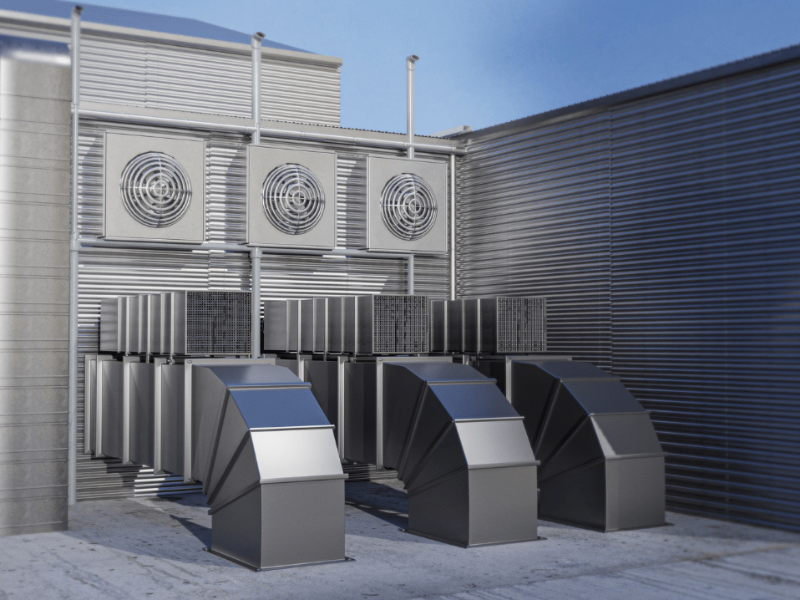What is FSM?
Field Service Management (FSM) refers to coordinating and optimising various tasks and processes involved in field operations, particularly for businesses with a mobile workforce.
FSM for HVAC Advantages…
• Scheduling
• Dispatching Workers,
• Tracking Job progress,
• Managing inventory,
• Invoicing and Billing,
• Communication between Field & Office.
FSM systems aim to streamline these tasks, enhance operational efficiency, and elevate customer satisfaction. They make them indispensable tools for businesses such as HVAC companies, utilities, and any service providers with technicians operating in the field.

Why Use FSM for HVAC
If you’re an HVAC (Heating, Ventilation, and Air Conditioning) company, using a Field Service Management (FSM) system would offer several key advantages in managing your operations more efficiently than a company that doesn’t use FSM. Here’s why you’d want to use an FSM and the corresponding benefits:

Complex Task Management: HVAC tasks range from routine maintenance checks to complex installations and emergency repairs. An FSM helps manage these tasks effectively.
Urgent Job Prioritisation: Breakdowns in HVAC systems, especially in extreme weather conditions, can be emergencies. FSM allows for prioritising such tasks and re-scheduling less urgent ones.

Skilled Workforce: Technicians in the HVAC industry have specialised skills. FSM systems ensure the right technician is sent for the job, matching skills to tasks.
Customer Expectations: Customers expect timely service and clear communication. FSM systems can offer automated updates to customers, enhancing the service experience.

Inventory Management: HVAC jobs often require specific parts. With FSM, you can track inventory in real time, ensuring technicians have the necessary components before they head to a job site.
Detailed Job Histories: FSM software allows HVAC companies to maintain comprehensive records for each customer. This includes past issues, solutions provided, parts used, and routine maintenance checks.
Advantages over a Company NOT using FSM for HVAC
If you’re an HVAC (Heating, Ventilation, and Air Conditioning) company, using a Field Service Management (FSM) system would offer several key advantages in managing your operations more efficiently than a company that doesn’t use FSM. Here’s why you’d want to use an FSM and the corresponding benefits:

Efficiency in Operations: With FSM, you can schedule and dispatch technicians more effectively, reducing downtime and increasing the number of jobs completed daily.
Increased Customer Satisfaction: With timely services, real-time updates, and the right technician sent for the job, customer satisfaction rates tend to be higher.
Safety and Compliance: Many FSM tools offer features to ensure both technicians’ safety protocols are followed and compliance with industry standards is maintained.

Reduced Operational Costs: Effective route optimisation ensures technicians use the shortest and quickest routes, saving on fuel and time costs.
Error Reduction: Automated systems mean reduced manual errors in tasks like billing, job allocation, and inventory management.
Scalability: As your HVAC business grows, FSM systems can adapt, ensuring consistent service quality regardless of the number of technicians or jobs.

Real-time Data and Insights: FSM systems can provide real-time data on job statuses, technician performance, and customer feedback, allowing for better decision-making.
Enhanced Professional Image: Using FSM systems can enhance the professional image of your HVAC business, as customers view tech-savvy companies as more competent and forward-thinking.
FSM vs Traditional Management
In summary, while both companies might offer similar HVAC services, the one using FSM is likely more efficient, cost-effective, and customer-friendly, gaining a competitive edge in the market and probably more profitable.
COTS vs Custom Design FSM for HVAC
When deciding on a Field Service Management (FSM) solution, businesses often choose between Commercial Off-The-Shelf (COTS) systems and Custom Design FSM.
COTS solutions are pre-built systems that offer standardised features and workflows designed to cater to a broad range of businesses. They’re typically quicker to deploy and may cost less upfront, but they may not always align perfectly with specific business processes or unique requirements.
Custom Design FSM systems are tailored to fit a particular business’s exact needs and specifications. While they might require more time and investment initially, they provide more flexibility. They can perfectly fit companies with specialised needs or those looking to scale in specific directions. The choice between the two often hinges on a company’s unique requirements, budget, and long-term growth strategies.
